In Japanese, the adverbial form of an adjective or noun is the one that's treated as an adverb, so that it can modify a verb or adjective. This would be their ren'youkei 連用形, and often, but not always, translates to English as the "~ly" suffix.
- {yasashiku} naderu
優しく撫でる
To caress {gently}.
- yasashiku - adverbial form of yasashii 優しい, "to be gentle."
- {sugu ni} akirameru
すぐに諦める
To give up {immediately}.
- sugu ni - adverbial form of sugu da すぐだ, "to be immediate."
- {ou ni} naru
王になる
To become {king}.
- ou ni - adverbial form of ou da 王だ, "to be king."
- {atsuku} moeru
熱く燃える
To burn {hot}.
- atsuku - adverbial form of atsui 熱い, "to be hot."
Conjugation
The adverbial form is in principle the ren'youkei of words. For i-adjectives, it ends in ~ku. Nouns and na-adjectives make use of the da だ copula, which is conjugated to the ni に adverbial copula.
Verbs don't have an adverbial form in principle, but the grammar concerning eventivization of statives requires statives to be turned into adverbs. Some stative predicates are expressed through verbs, so verbs need a way to turn into adverbs.
This ways is through the ~you da ~ようだ suffix (jodoushi 助動詞), whose adverbial form is ~you ni ~ように.
| Verbs | |
|---|---|
| suru する |
suru you ni するように |
| i-Adjectives | |
| kawaii 可愛い |
kawaiku 可愛く |
| na-Adjectives | |
| kirei na 綺麗な |
kirei ni 綺麗に |
| no-Adjectives | |
| futsuu no 普通の |
futsuu ni 普通に |
| Irregular Adjectives | |
| ii いい |
yoku よく |
There are several other constructions that can be considered adverbial in one way or another, such as translating to "while:"
- The te-form, including the de で copula.
- The ~naide ~ないで form, which is a te-form.
- The zu-form would be an adverbial form of the nu-form, since ~zu ~ず is a ren'youkei of ~nu ~ぬ.
- ~nagara ~ながら and ~aida ni ~間に.
However this article isn't about such forms. This article is about the ren'youkei form that can be used with adjectives that express frequency and intensity to create frequency and intensity adverbs, something the other "adverbial" forms listed above can't do.
The negative form of i-adjectives is formed with the adverbial form plus the negative form of the auxiliary verb aru ある, nai ない: kawaiku-nai 可愛くない, "not cute." In fact, other forms also derive from this but they're harder to notice because they're contracted: kawaikatta 可愛かった, "was cute," comes from kawaiku-atta, with atta あった being the past form of aru.
Grammar
Modifying Verbs
The adverbial form is used for a very simple reason:
- Adjectives modify nouns.
- Adverbs modify verbs.
When you have a noun, and you need to modify it, you use an adjective:
- kuruma ga hayai
車が速い
The car is fast.- kuruma - a noun marked as the subject.
- hayai - an i-adjective in the "predicative form," shuushikei 終止形.
- {hayai} kuruma
速い車
The car [that] {is fast}.
The {fast} car.- kuruma - the relativized subject of a relative clause.
- hayai - an i-adjective in "attributive form," rentaikei 連体形.
- Tarou wa shoujiki da
太郎は正直だ
Tarou is honest.- Tarou - a proper noun marked as the topic, which is the subject of the predicate.
- shoujiki da - a na-adjective in shuushikei predicating Tarou.
- {shoujiki na} Tarou
正直な太郎
Tarou, [who] {is honest}.
The {honest} Tarou.
- Tarou - relativized subject.
- shoujiki na - a na-adjective in the rentaikei.
When you have a verb, you can't use the rentaikei, the same way you would use the rentaikei before nouns.
- hashiru
走る
To run. - *{hayai} hashiru
速い走る
Intended: "to run {fast}." - *{shoujiki na} iu
正直な言う
Intended: "to say {honestly}."
In this case, you use the ren'youkei, that is, the adverbial form:
- {hayaku} hashiru
速く走る
To run {fast}.- hayaku - the ren'youkei of hayai.
- hashiru - a verb modified by the adverb hayaku.
- {shoujiki ni} iu
正直に言う
To say {honestly}. To speak {frankly}.- shoujiki ni - the ren'youkei of shoujiki da.
- iu - a verb modified by the adverb shoujiki ni.
- Context: Akaza Akari 赤座あかり, a 13 years old girl, regrets not being 14 years old like her friends, because they started middle school one year before her, so she spent a whole year without going to school with them.
- aaa...
あーあ・・・
Aah... (sigh.) - Akari ga {mou ichinen hayaku} umaretetara dougakunen datta noni
あかりがもう一年早く生まれてたら同学生だったのに
If Akari had been born {one year sooner} [we] would have been in the same year of school.
- umaretetara - contraction of umarete-itara 生まれていたら.
- Literally, it says "one year quicker," but in English we say "sooner."
- Akari uses her own name as first person pronoun.
- umaretetara - contraction of umarete-itara 生まれていたら.
- Akaza Akari (juu-san)
赤座あかり(13)
Akaza Akari (thirteen).- In Japanese, a number inside parentheses after someone's name typically indicates their age.
- The family name (Akaza) comes before the given name (Akari), opposite to the name ordering in America, for example.
Resultative Statives
In English, it's possible to use an adjective word after a verb to express the subject or object can be predicated by that adjective after that action takes place. For example:
- John jumped high.
- After John jumped, he was high in the air, jumping resulted in him being high.
- To paint the wall white.
- After painting the wall, the wall was white, painting the wall resulted in it being white.
These are sometimes called resultative adjectives, but syntactically they're adverbs. When the adverbial form of an adjective is identical to their base form, that's called a flat adverb.
In Japanese, this sort of sentence is expressed through the adverbial form:
- {takaku} tobu
高く飛ぶ
To jump {high}.
?To {highly} jump. - kabe wo {shiroku} nuru
壁を白く塗る
To paint the wall {white}.
???To {white-ly} paint the wall.
So in English you have a flat adverb like "high," but in Japanese you have the adverbial form takaku.
Anime: The iDOLM@STER, アイドルマスター (Episode 15, Stitch)
- Context: a double ILY sign.
- {kawaiku} kaizou saretai!
かわいく改造されたい
[I] want remodeled {cute}. (literally.)
- In the sense of wanting to be transformed into a cute version of oneself.
- kaizou suru - suru-verb, the kai morpheme means "to change," and zou means "structure," so one can guess from the kanji that the word means "to change the structure" of something, typically to modify a house or car, to upgrade it, it's seldom used in the sense of to modify human beings, as it sounds like some mad doctor doing surgeries to create super-humans or something.
The same idea applies when the adverbial form is used with the ergative pair of eventivizers naru なる, "to become," and suru する, "to make become."
- kabe ga {shiroku} naru
壁が白くなる
The wall becomes {white}. - kabe wo {shiroku} suru
壁を白くする
To make the wall become {white}.
To make the wall {white}.
This pair, in particular naru, exist because in Japanese the nonpast form of stative predicates isn't used to express the future tense by itself. Such stative predicates include adjectives and nouns, as well as stative verbs and the habitual usage of eventive verbs.
- shiroi
白い
Is white.
*Will be white. - toumei da
透明だ
Is transparent.
*Will be transparent. - kanji ga yomeru
漢字が読める
Is able to read kanji.
*Will be able to read kanji. - hon wo yomu
本を読む
Will read a book/the book/the books. (future perfective.)
Reads books [habitually]. (present habitual.)
*Will read books [habitually]. (future habitual.)
To make the above future-tensed, naru is necessary, and naru takes the stative as an adverb, thus the stative must be conjugated to its adverbial form:
- {shiroku} naru
白くなる
Will become {white}.
Will be {white}. - {toumei ni} naru
Will become {transparent}.
Will be {transparent}.
In the case of stative verbs like yomeru, and the habitual sense of the eventive verb yomu, i.e. in the case of verbal statives, there is no "adverbial form" in principle, but as noted previously we can use the ~you da suffix to make the syntax work:
- {{kanji ga yomeru} you ni} naru
漢字が読めるようになる
To become {in a way [that] {is able to read kanji}}.
To become able to read kanji. - {{hon wo yomu} you ni} naru
本を読むようになる
To become {in a way [that] {reads books}}.
To start reading books. - {{hon wo yomanai} you ni} naru
本を読まないようになる
To become {in a way [that] {doesn't read books}}.
To stop reading books.
Finally, just like we can use takaku tobu with a resultative stative takaku, it's also possible to use a ~you ni phrase as resultative stative:
- {{kanji ga yomeru} you ni} benkyou shita
漢字が読めるように勉強した
[I] studied {so [that] {[I] could read kanji}}.- Here, "to study," benkyou suru, results in kanji ga yomeru, "to be able to read kanji."
Modifying Copulative Verbs
Verbs considered copulative also take a flat adverb in English and are similarly modified by the adverbial form in Japanese. For example:
- {kawaiku} mieru
可愛く見える
To look {cute}.- From the way it looks, it "is cute," kawaii.
- {kantan ni} kikoeru
簡単に聞こえる
To sound {easy}.- From the way it sounds, it "is easy," kantan da.
- This sentence may also mean one "easily" hears something, but typically it's used in the "it's harder than it sounds" kind of way. It sounds easier than it actually is.
Typically mieru isn't used with verbs, the sou そう suffix in its adverbial form is used instead:
- {taberare-sou ni} mieru
食べられそうに見える
[It] looks {like [one] can eat [it]}.
[It] seems edible.
- Generally in the sense of you can't, because it's poisonous or something.
But one could still use kikoeru like this:
- {{mujun suru} you ni} kikoeru
矛盾するように聞こえる
To sound {{contradictory}}.- mujun suru - to contradict itself.
The phrase you ni ように also has a usage when its relative clause is in past form, to say something "looks/sounds like" it happened.
- {{nani-ka ga bakuhatsu shita} you ni} kikoeta
何かが爆発したように聞こえた
[It] sounded {like {something exploded}}.
Modifying Adjectives
Adverbs can also be used to modify adjectives.
- eien da
永遠だ
To be eternal. - {eien ni} tanoshii
永遠に楽しい
To be {eternally} fun.
It's also possible to chain adjectives using their rentaikei 連体形, which means something else instead. Compare:
- {{eien ni} tanoshii} monogatari
永遠に楽しい物語
A tale [that] {is {eternally} fun}.
- Here, being fun is eternal.
- {eien na} {tanoshii} monogatari
永遠な楽しい物語
A tale [that] {is eternal and} {is fun}.
- Here, the tale is eternal, and is also fun.
An example with i-adjectives:
- {hageshii} {hayai} kyoku
激しい速い曲
A song [that] {is intense and} {fast}.- The song is both hageshii and hayai.
- {{hageshiku} hayai} kyoku
激しく速い曲
A song [that] {is {intensely} fast}.- The song is hayai to a hageshii degree.
Parallel Adjectives
Confusingly, when the adverbial form is used to modify another adjective, it's possible to get the "and" meaning nevertheless. For example:
- {{kanashiku} setsunai} monogatari
悲しく切ない物語
A tale [that] {is {sadly} painful}.
A {{sad}, painful} tale.- setsunai - emotionally painful, lone, that causes a heartache.
This works just like the te-form.
- {{kanashikute} setsunai} monogatari
悲しくて切ない物語
A tale [that] {{is sad and} is painful}.
A {{sad}, painful} tale.
The same principle applies to verbs, by the way: both the te-form and ren'youkei of verbs can be used to say "and."
Frequency Adverbs Modifying Statives
When an adjective adverbially modifies another adjective, the meaning in Japanese is that the second adjective "is" the first one. For instance, {eien ni} tanoshii means "to be eternally fun" because "to be fun" "is eternal."
This nuance becomes apparent when the adverb is one of frequency. For example, if we said:
- mezurashii
珍しい
To be rare. - {mezurashiku} samui
珍しく寒い
*To be rarely cold. (literally.)
To be cold (right now), and it being cold being something that rarely happens.
Above, the translation "to be rarely cold" is wrong. When we say things like:
- It's rarely cold in Haiti.
- It rarely rains in the Sahara.
These are called frequentative sentences, in which a predicate, "to be cold," "to rain," is modulated by some frequency adverb like "rarely," or cyclic phrase like "every year."
- It's cold in Haiti every year.
- It rains in the Sahara once per year.
When we use a frequentative predicate like the above we're merely saying something occurs with a given frequency, we're not saying that the thing is occurring right now.
- It's rarely cold in Haiti (doesn't mean it's cold right now in Haiti.)
- It's cold every year in Haiti (doesn't mean it's cold right now in Haiti, either.)
By contrast, the phrase {mezurashiku} samui means that it "is cold," samui, right now, and that being cold "is rare," mezurashii, so it's closer to:
- It's cold for once in this sweaty, arid place!
To say the frequentatives in Japanese we could say:
- {{samuku} naru} no wa mezurashii
寒くなるのは珍しい
{Becoming {cold}} is rare.
[It] rarely {becomes {cold}}. - {ame ga furu} no wa mezurashii
雨が降るのは珍しい
{Raining} is rare.
The same principle applies to using the adverb with the ~te-iru form:
- {mezurashiku} ame ga futte-iru
珍しく雨が降っている
*[It] is {rarely} raining.
[It] is raining (right now), and that {is rare}.
[It] is raining for once.
Flat Adverbs
The word sugoi すごい, "to be incredible," can be used adverbially in its base form. Although this seems to occur with some frequency, it's generally regarded as grammatically wrong.
Anime: Uzaki-chan wa Asobitai! 宇崎ちゃんは遊びたい! (Episode 1)
- Context: an anime girl with a lip fang and a shirt spelling in romaji:
- {sugoi} dekai
すごいでかい
{Incredibly} big.
- The proper grammar would be:
- {sugoku} dekai
すごくでかい
Note that this usage is really unusual. While one could say:
- {sugoi} tanoshii
すごい楽しい
{Very} fun. - {sugoi} kowai
すごい怖い
{Very} scary.
You can't say:
- *{mezurashii} tanoshii
珍しい楽しい
Intended: {rarely} fun. - *{jimi na} tanoshii
地味な楽しい
Intended: {ordinarily} fun.- jimi - plain, ordinary, in the sense of lacking anything special about it.
- The antonym of hade 派手, "gaudy," "fabulous," that attracts attention.
Another word that allows this usage is yabai やばい, which is often used in slang, and is also used as an intensifier like sugoi:
- {yabai} tanoshii
やばい楽しい
{Ridiculously} fun. - {yabai} kowai
やばい怖い
{Ridiculously} scary.
Both sugoi and yabai have so many uses that it's hard to translate them to English. The word sugoi can mean "amazing," while yabai is more close to "terrifying," "dangerous," but dangerous being radical, and rad being cool, and cool being amazing, yabai ends up meaning incredible.
Perhaps, considering how limited this usage seems to be, what's happening is that by {yabai} tanoshii we're saying it's tanoshii to a degree one would exclaim yabai, that by {sugoi} tanoshii, it's so tanoshii one would say:
- sugoi!
すごい!
[It] is amazing!
Wow!
As mentioned previously, using the base form of an adjective adverbially is called a flat adverb in English, so these would be Japanese flat adverbs instead.(keio.ac.jp/~rhotta:real bad と「すごいヤバい」)
Online, Japanese articles about formal writing for businesses will note that this usage is grammatically wrong, a mistake that should be avoided when writing businesses e-mails, and so on. The fact it seems to be used mostly with slang-y words doesn't inspire much confidence, either.
However, Masui Norio 増井典夫(1987:78, as cited in keio.ac.jp/~rhotta:real bad と「すごいヤバい」) says:
- {kono you ni} "sugoi" wa "{{{{kisoku ni hanshite} {atarashiku} tsukaware}-hajimeta} hyougen to kangaerareru} wake de aru ga, {"sugoku" no kawari ni "sugoi" wo mochiiru} no wa saikin de atte mo, {sore ni {yoku} nita} rei wa kinsei ya kindai ni mo mirareru mono de atta.
このように「すごい」は「規則に反して新しく使われ始めた表現と考えられるわけであるが,「すごく」の代わりに「すごい」を用いるのは最近ではあっても,それによく似た例は近世や近代にも見られるものであった。
{Like this}, "sugoi" {can be thought of as "an expression [that] {began {being used {recently} {[and goes] against [the grammar] rules}}}}, however although {using "sugoi" instead of "sugoku"} is [something] recent, examples {{very} similar to this} can be seen in kinsei and kindai.- Both kinsei and kindai mean "recent times," but may also be used as historic terms: kinsei being from the 16th century (Azuchi–Momoyama period), until the Edo period, and kindai being from the Meiji period to the end of the second world war.
- kono "keiyoushi shuushi-rentaikei no fukushi-teki youhou" wa, {"teido no hanahadashisa" wo arawasu} keiyoushi no naka ni mirareru} youhou de aru.
この「形容詞終止連体形の副詞的用法」は,「程度のはなはだしさ」を表わす形容詞の中に見られる用法である。
This "adverbial usage of the predicative-attributive-form of an adjective", is a usage {seen among adjectives [that] {express "degree of intensity"}}.- shuushikei - predicative form.
- rentaikei - attributive form.
- shuushi-rentaikei - most likely both forms because in this case they are identical, so we don't know if sugoi tanoshii has sugoi in its rentaikei or shuushikei.
- gendai-go ni oite {"teido no hanahadashi-sa" wo arawasu}, {ren'youkei no katachi de keiyoushi, keiyou-doushi nado wo shuushoku suru} keiyoushi toshite {"erai", "osoroshii", "sugoi", "suzamashii", "subarashii", "mono-sugoi" to itta} go ga agerareru. kono uchi {hobo mujouken de keiyoushi, keiyou-doushi nado wo shuushoku-kanou na} mono to naru to "erai," "osoroshii," "sugoi," "mono-sugoi" ni kagirareru.
現代語において「程度のはなはだしさ」を表わし,連用形の形で形容詞・形容動詞などを修飾する形容詞として「えらい」,「おそろしい」,「すごい」,「すさまじい」,「すばらしい」,「ひどい」,「ものすごい」といった語が挙げられる。このうちほぼ無条件で形容し・形容動詞などを修飾可能なものとなると「えらい」,「おそろしい」,「すごい」,「ものすごい」に限られる。
In modern-language, as adjectives [that] {express "degree of intensity" and}, {qualify i-adjectives, na-adjectives, etc., in their attributive forms}, [I] can list the words {"erai," "osoroshii," "sugoi," "suzamashii," "subarashii," "mono-sugoi"}. Among these, the ones [that] {can qualify i-adjectives, na-adjectives, etc., almost without restriction} would be limited to "erai," "osoroshii," "sugoi," "mono-sugoi."- keiyoushi - literally "description word," "adjective," is the Japanese term for an i-adjective.
- keiyou-doushi - literally "description verb," "adjectival verb," is the Japanese term for na-adjective.
According to the above, although the usage feels like slang even now, and isn't accepted in formal contexts, it has actually existed for centuries as part of the language.
The text doesn't list yabai (perhaps because it wasn't common in the pre-gyaru times of 1987), but it does list some other words that can be used similarly:
- erai
偉い
Important. Distinguished.- Use toward someone "important" because they're a high-ranking officer, because they're rich, etc.
- Used toward a child that is "good" because they're well-behaved and did something well.
- Used toward a situation that a situation that has became too big, has gone out of control, involved the police, the army, the men in black, etc.
- osoroshii
恐ろしい
Terrifying.- Used as intensifier in the idea of a scale one would be terrified of.
It seems erai can be used as a flat adverb(examples from The Balanced Corpus of Contemporary Written Japanese):
- "anta no okaa-san, ikutsu ya?" "kotoshi, yon-juu-san desu" "e'? {erai} hayai-n-tochuu?"
「あんたのお母さん、いくつや?」 「今年、四十三です」 「エッ?えらい早いんとちゃう?」
"How old is your mother?" "forty three this year." "Eh? {Too} early, [don't you think]?"- Although I don't know the context, it probably means "too early" in the sense of "she's too young."
- tochuu is dialectal for janai じゃない, "isn't it," "don't you think."
- saki-hodo no jichishou no go-touben dewa, {chihou-jichitai ni {futan wo suru} kinou wo ataeru} toiu fuu na, {{erai} muzukashii} o-kotoba ga gozaimashita.
先ほどの自治省の御答弁では、地方自治体に負担をする機能を与えるというふうな、えらいむずかしいお言葉がございました。
Just now in the ministry of home affair's response, {to give local municipalities the ability {to bear [a cost or responsibility]}}, such {{extremely} difficult} words existed.- In the sense that such words were in the response, it contained such words, such words were said
The word osoroshii probably can be used similarly, too, but I haven't been able to find an example in the BCCWJ.
At Sentence End
The adverbial form can sometimes be found at sentence end position, in an incomplete sentence where the verb or adjective that the adverb modifies has been omitted, most likely because it's obvious from context so it can be understood pragmatically. For example:
- motto hayaku...!
もっと速く・・・!
More quickly...!
Faster...!
This is the sort of sentence you'd see in a car racing series while eurobeats intensify in the background, or perhaps in a fighting series with a character min-maxing agility.
In any case, the modified word is missing; Whether it is "become" faster, "run" faster, or "strike" faster, the verb simply isn't there, and the sentence ends at hayaku.
This is particularly common with naru なる as the sentence ends with a stative in its adverbial form:
- Context: a misunderstanding.
- ore ga.. {onna ni} naru
オレが・・女になる
I.. will become a woman. - Kiyoshi-dono ga {onna ni} φ....?
キョシ殿が女に・・・・?
Kiyoshi-dono [will become].... {a woman}? - neko sengen kita..!!
ネコ宣言キタ・・!!
Bottom declaration arrived..!! (literally.)
He declared himself a bottom!!- In this scene, Kiyoshi decides to disguise himself as a woman to infiltrate a place, hence "to become a woman." Other characters, hearing this, and imagining Kiyoshi was in a gay relationship with the the other interlocutor, misinterpreted it as him declaring himself the "woman" in the relationship.
- Context: Tetsutetsu Tetsutetsu 鉄哲徹鐵, whose body turns into "iron," tetsu 鉄, explains why he is the one to face Todoroki Shouto 轟焦凍 in battle, who can use fire.
- kikanee kara da yo
効かねェからだよ
Because [it] doesn't have effect!
Because the fire doesn't work on me!- kiku
効く
To have effect.
- kiku
- kondo a Tetsutetsu ga chinchin da yo oi...!!
今度ァてつてつがチンチンだよオイ・・・!!
Tetsutetsu is chinchin(※see note below) now, oy...!!- kondo - "this time," "now."
- a ア - contraction of the wa は particle.
- shuuu
シュウウ
*vapor fuming* - ※ichibu chiiki de "atsu-atsu" no koto da kara ne!
※一部地域で“熱々”のことだからね!
※In a certain region [it] means "atsu-atsu" [you see]!- atsu-atsu, "very hot" - intensifying reduplication of atsui 熱い, "hot."
- “” - quotation marks.
- netsu de {akaku} [natta]...!
熱で赤く・・・!
[He] [became] {red} with heat...!
For reference, some other examples:
- Context: Zatch Bell ガッシュ・ベル did something he shouldn't have, enraging Takamine Kiyomaro 高嶺清麿.
- shikata... naku...
仕方・・・なく・・・
[There was no other way.] (literally)
[It couldn't be helped.]
- shikata ga nai
仕方がない
There is no way of doing [it]. (literally.)
There is no other way to do it, no way of avoiding doing it, so I had to do it. - {shikatanaku} kita
仕方なく来た
{It couldn't be helped}, so [I] came [here]. (by hiding in your school bag.)
- shikata ga nai
- ko......no......
こ・・・・・・の・・・・・・
[You...... little......]
- See also: swearing with kono この.
- nanda nanda!?
何だ何だ!?
What is it what is it!? - zawa zawa
ザワザワ
*commotion*
- Context: in order to repay a monetary debt, Fujioka Haruhi 藤岡ハルヒ has to pretend to be a boy at a high school host club, and to play the part she uses the first person pronoun ore 俺, which is masculine. Hearing her say this, the club president, Suou Tamaki 須王環, who instantly started acting like he's her father, says:
- {onna no} ko ga "ore" nante ikemasen!!
女の子が「俺」なんていけません!!
Girls shouldn't [say] "ore!"- ikemasen - literally "can't go," translates as "shouldn't."
- okaasan!!! Haruhi ga {kitanai} kotoba wo tsukau you~~!!!
おかーさん!!!ハルヒが汚い言葉を使うよウーー!!!
Mother!!! Haruhi is using {dirty} words!!!- Here, "mother," okaasan お母さん, is being used like "hey, mother of my daughter, hear me." In Japanese, family words that denote superiority by seniority (father, grandfather, uncle, older brother, etc.) can be used as titles relative to a family member of lower status (the daughter here).
- So when Tamaki uses okaasan in front of Haruhi (his daughter), he's referring to Haruhi's okaasan (his wife).
- okaasan? dare?
お母さん?誰?
Mother? Who [is it]? - ore ka ne... nantonaku
俺かね・・・なんとなく
Me, [I think]...- nantonaku - it just feels like it's so, used when you feel something is true for some reason or another, but you can't say exactly why you feel like that.
- nanto nai なんとない is unusual, but it should mean there is nothing worthy of note, nothing to say. You're more likely to see nanto mo nai なんともない, which is used when someone asks if someone else is injured or something, and they'll say "it's nothing," "nothing wrong," "I'm fine."
- {nantonaku} wakatte kita
なんとなくわかってきた
[I] got [it] {somehow}.
I {kind of} get the idea. - In this case, it would be because Ootori Kyouya 鳳鏡夜 is the vice-president of the club, so the club president is acting like he's the father, and in his imagination the vice-president would be the mother, and the vice-president just sort of figured that out.
The phrase ~you ni is the adverbial form of ~you da, so I guess it also counts for this section when ~you ni is used at the end of a sentence in prayers and the sort:
- Context: it's new year, someone goes to a temple and claps twice before praying:
- {minna {shiawase ni} naru} you ni
みんな幸せになるように
So [that] {everyone becomes {happy}}. (literally.)- I pray for everybody to be full of happiness.
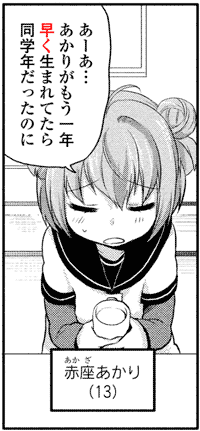


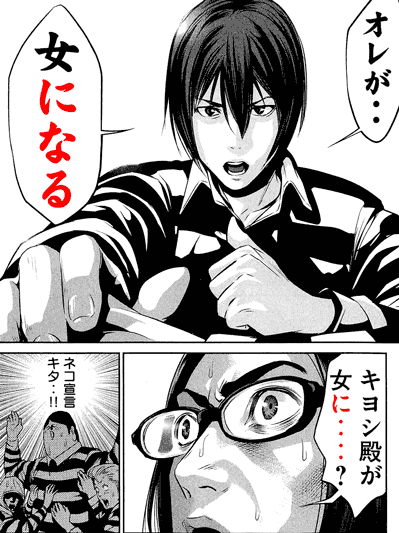
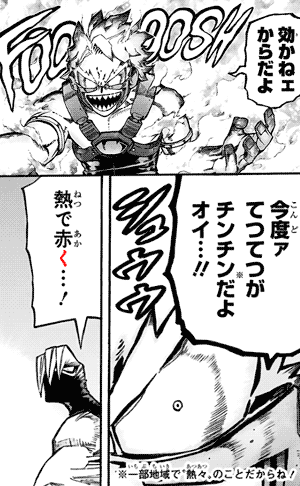
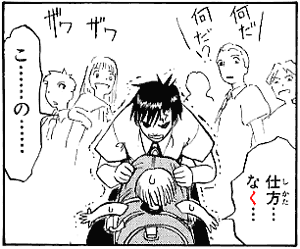
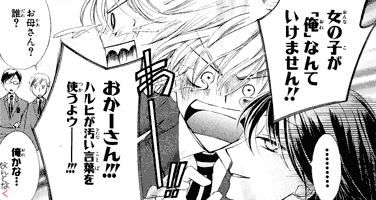
No comments: